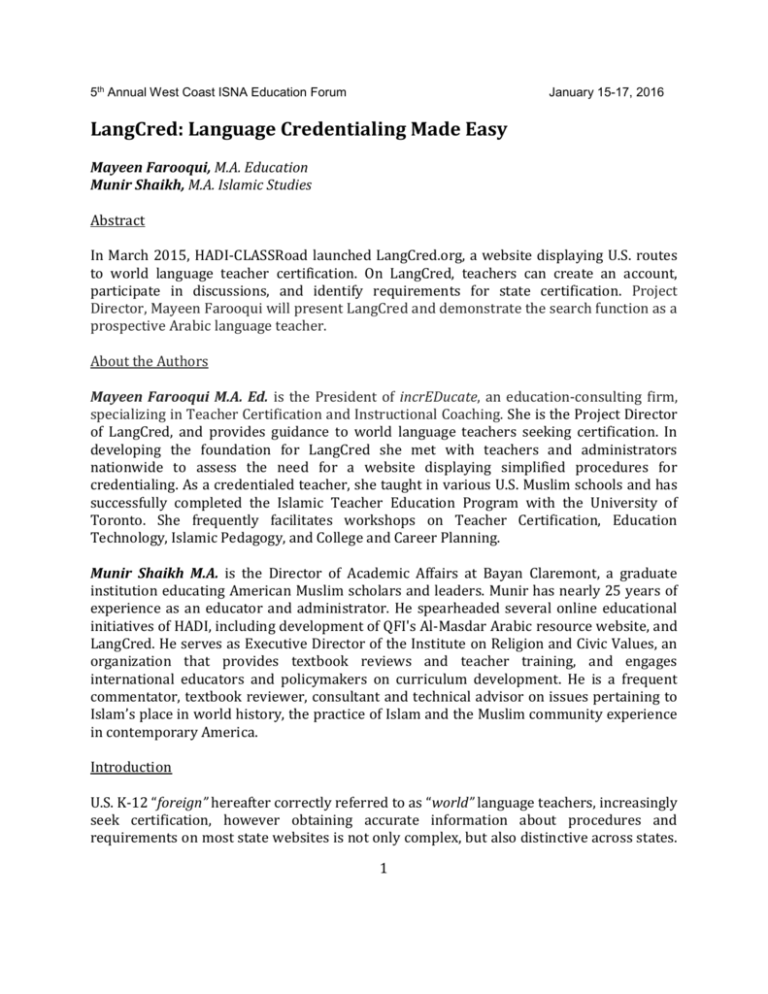
5th Annual West Coast ISNA Education Forum
January 15-17, 2016
LangCred: Language Credentialing Made Easy
Mayeen Farooqui, M.A. Education
Munir Shaikh, M.A. Islamic Studies
Abstract
In March 2015, HADI-CLASSRoad launched LangCred.org, a website displaying U.S. routes
to world language teacher certification. On LangCred, teachers can create an account,
participate in discussions, and identify requirements for state certification. Project
Director, Mayeen Farooqui will present LangCred and demonstrate the search function as a
prospective Arabic language teacher.
About the Authors
Mayeen Farooqui M.A. Ed. is the President of incrEDucate, an education-consulting firm,
specializing in Teacher Certification and Instructional Coaching. She is the Project Director
of LangCred, and provides guidance to world language teachers seeking certification. In
developing the foundation for LangCred she met with teachers and administrators
nationwide to assess the need for a website displaying simplified procedures for
credentialing. As a credentialed teacher, she taught in various U.S. Muslim schools and has
successfully completed the Islamic Teacher Education Program with the University of
Toronto. She frequently facilitates workshops on Teacher Certification, Education
Technology, Islamic Pedagogy, and College and Career Planning.
Munir Shaikh M.A. is the Director of Academic Affairs at Bayan Claremont, a graduate
institution educating American Muslim scholars and leaders. Munir has nearly 25 years of
experience as an educator and administrator. He spearheaded several online educational
initiatives of HADI, including development of QFI's Al-Masdar Arabic resource website, and
LangCred. He serves as Executive Director of the Institute on Religion and Civic Values, an
organization that provides textbook reviews and teacher training, and engages
international educators and policymakers on curriculum development. He is a frequent
commentator, textbook reviewer, consultant and technical advisor on issues pertaining to
Islam’s place in world history, the practice of Islam and the Muslim community experience
in contemporary America.
Introduction
U.S. K-12 “foreign” hereafter correctly referred to as “world” language teachers, increasingly
seek certification, however obtaining accurate information about procedures and
requirements on most state websites is not only complex, but also distinctive across states.
1
5th Annual West Coast ISNA Education Forum
January 15-17, 2016
Noriko Ishihara (2010) posits that unlike non-native speaking world language teachers,
native speaking world language teachers (the majority) are new to the U.S. and may have
difficulty navigating through the unfamiliar institutional discourse of the American
education system. Many such teachers rely on informal networks for clarification, or
independently piece together the steps needed depending on their individual
circumstances. Information is limited, or several layers deep in existing online sources.
Teacher certification is a central issue connected to adequate teacher supply. The National
Foreign Language Center (NFLC) at the University of Maryland’s 2010 white paper, The
Teachers We Need: Transforming World Language Education in the United States, suggests
teacher supply impinges directly on the availability and quality of world language
education, yet, “categories of certificates and licenses vary widely from state to state and
are difficult to navigate, align, and compare. These non-standardized categories and
requirements create confusion and a lack of portability from state to state. Prospective
teachers may have difficulty obtaining accurate information about requirements…” (p. 15).
As of 2014, the NFLC estimated that 41% of language teachers in the U.S. are currently
interested in obtaining certification.
In the Spring of 2014, HADI-CLASSRoad, a non-profit education/technology initiative and
leader in online professional development for world language teachers, obtained the
STARTALK Infrastructure Building Initiative Grant to develop LangCred.org, a first-of-itskind interactive resource website displaying world language teacher certification routes
from 50 states, districts and territories. CLASSRoad has provided numerous STARTALK
summer teacher programs to hundreds of language professionals, and enthusiastically
sought to help address the credentialing challenges faced by U.S. K-12 world language
teachers.
The CLASSRoad research team traveled to conferences, colleges, and public and private
schools, consulting with numerous K-12 world language teachers, administrators and
personnel. Feedback revealed a dominant theme: although state agency websites are
informative, they lack explicit, “step-by-step” instructions, and the complex language and
layout can be “intimidating.” Additional comments from world language teachers and
administrators include:
● I don’t understand all the regulations.
● English is fine with me but [I] need to have simple [,] direct steps on how to apply…
● This will be so helpful to teacher candidates, but also to school districts needing to
figure out how to get their candidates moving through the process based on their
current education and experience.
● A resource website would be a treasure house of useful information as well as a
travel guide on the path to language teaching.
2
5th Annual West Coast ISNA Education Forum
January 15-17, 2016
● I think that...[a website like LangCred] would help develop capacity, resulting in
more ease of staffing. The more potential teacher candidates we have, the better we
will be able to staff our programs in the middle and high schools…
Arabic Language Teacher Credentialing
CLASSRoad surveyed hundreds of K-16 Arabic language professionals in the U.S. regarding
Arabic language teacher credentialing. Approximately 80% of Arabic teachers were
working in private, mostly religious, schools. Regarding credentialing, 13% of respondents
held general U.S. teaching credentials, and 17% held a U.S. Arabic language teaching
credential. Approximately 19% held Arabic teaching credentials from outside the U.S. and
expressed interest in degree equivalency. Of the respondents, only 9% were enrolled in a
traditional or alternative teacher preparation program issuing an Arabic language teaching
credential. Common challenges cited by Arabic language teachers were Arabic program
access, availability, and cost. Many also indicated that employing agencies such as private
and religious schools do not require certification and provide little incentive and, or
support toward certification.
Arabic language teachers and other teachers of the Less Commonly Taught Languages
(LCTLs)1 greatly benefit from a resource like LangCred that simplifies complex state
procedures for certification.
On LangCred.org Arabic language teachers can search, save and compare potential
credential routes, discuss critical issues on the LangCred Community forum, and find a
suitable teacher preparation program close to their home.
The California Example
California (CA) credential issuance is based entirely on an applicant’s academic and
professional background, and private school experience is valued. To obtain an initial,
traditional, five-year Preliminary Single Subject Teaching Credential, teachers must have a
bachelor’s degree (or equivalent), passing scores on a basic skills (English, Math) exam
such as the:
● CBEST
● CSU Exams
● AP English/Literature and AP Calculus I or AP Calculus II
● SAT
● ACT
1
All languages except English, French, German, and Spanish,
3
5th Annual West Coast ISNA Education Forum
January 15-17, 2016
Applicants must provide evidence of subject matter proficiency through successful passing
of a content language or subject matter exam. In California, the California Subject
Examinations for Teachers (CSET) in Arabic is required. Applicants must also complete a
state-approved teacher preparation program for formal training, including a clinical, or
student teaching component. Exam scores, Grade Point Average (GPA), and letters of
recommendation determine admission into many programs. In many districts, internship
options exist and teachers are well supported. Upon completion of a program or internship,
the program sponsor must apply directly to the California Commission on Teacher
Credentialing (CCTC) for the credential. Employment is not required for the Preliminary
Single Subject Credential.
Private School Teachers
Prospective teachers with three or more years of private school teaching experience in an
accredited private school, may qualify for the Preliminary or subsequent, Clear Single
Subject Teaching Credential. Teachers may apply directly to the CCTC, granted they meet
the following requirements: background check, basic skills, subject matter, U.S.
Constitution, reading, technology, First Aid, CPR, and English Language Learner (ELL)
authorization.
To obtain the alternative, Sojourn Certificated Employee Credential, requirements include
the following: one year of employment as an Arabic language teacher in a CA public school
prior to applying, at least 90 units of college coursework (transcript evaluation required), a
district administered Basic Skills exam2, and Subject Matter exam3. One must also obtain
confirmation from the employing school district that they are biliterate-bilingual in Arabic.
The Sojourn is renewable every two years and consistent employment under the Sojourn
leads to a Preliminary Single Subject Teaching Credential.
An induction period or program is required for all teachers holding Preliminary Single
Subject Teaching Credentials who seek the subsequent Clear Single Subject Credential. The
CCTC does make exceptions and an applicant’s academic and professional background is
evaluated carefully. Both the aforementioned traditional and alternative credentials
guarantee the individual an authorization to teach the Arabic language in California public
schools.
LangCred.org
Upon completion of research into traditional and alternative routes in California, Michigan
and Illinois, CLASSRoad identified a series of steps for language teacher certification:
2
A one-year non-renewable credential is offered to those who have not yet completed the Basic Skills exam.
Teachers educated outside the U.S. can request a waiver of subject matter requirements if the language of
instruction in their college outside the U.S. was in the content language they desire to teach.
3
4
5th Annual West Coast ISNA Education Forum
January 15-17, 2016
Step 1: Possess a minimum academic background of a bachelor’s degree.
Step 2: Fulfill general and content language pedagogy requirements via exams, courses,
experience, and/or degree evaluation.
Step 3: Apply to the state for certification as an individual, via a traditional or alternative
TEP, or through an employing agency.
CLASSRoad’s team designed a relational database to enable standardization of statespecific data. After standardizing collection of unique procedures and multiple credential
routes in each state, and obtaining expert feedback from world language professionals, we
developed the website, LangCred.org, launched in March of 2015.
Each state credential route on LangCred.org details the following:
1.
2.
3.
4.
5.
6.
7.
8.
State Agency Contact Information, Credential Identification
Minimum Academic Background Requirements
Pedagogy and Content Language Requirements
Oral Language Proficiency and English Language Proficiency Requirements
Background Check, First Aid, Transcript Evaluation Requirements
Application Procedures, Fees
Renewal Procedures, Fees
Unique State Requirements
LangCred.org, is a first-of-its-kind interactive resource website for world language teacher
certification. Teachers can search for routes from the 50 states, DC, Puerto Rico, Guam, and
the U.S. Virgin Islands. After making a user account teachers can search, save and compare
credential routes, upload documents, and participate in the LangCred Community forum. A
rich resource section with a glossary of terminology and articles related to world language
teacher certification is available on the site.
Recognizing that world language teachers with degrees from outside the U.S. must obtain
transcript evaluations to determine if they are eligible to pursue certification, CLASSRoad
also developed a detailed list of state approved transcript evaluation agencies. CLASSRoad
hopes to conquer roadblocks to world language teacher certification by developing much
needed resources and simplified information for language teachers.
CLASSRoad has obtained the STARTALK Infrastructure Building Initiative Grant in 2015
once more and is currently updating LangCred with new features and enhancements
launching in March 2016.
Conclusion
5
5th Annual West Coast ISNA Education Forum
January 15-17, 2016
LangCred is the first site to ever deploy such a plethora of information on world language
teacher certification in one location. While particularly exciting for teachers of Arabic, the
website has been of tremendous value to all world language teachers, program
administrators, and personnel. Individual language teachers should no longer feel alone
hitting roadblocks on their path to certification.
The work presented here has profound research value for future studies of language
teacher certification and preparation, and we are confident it will play an important role in
alleviating the problem of the dearth of highly qualified language teachers.
References
California Commission on Teacher Credentialing. (2015). Basic Skills Requirement.
Retrieved from
http://www.ctc.ca.gov/credentials/leaflets/cl667.pdf
California Commission on Teacher Credentialing. (2015). The Sojourn Certificated
Employee Credential. Retrieved from
http://www.ctc.ca.gov/credentials/leaflets/cl568.pdf
Darling-Hammond, L., Berry, B., & Thoreson, A. (2001). Does Teacher Certification Matter?
Evaluating the Evidence. Educational Evaluation and Policy Analysis, 23(1), 57-77
Hart, B., Malone, M., & Ellis, D., U.S. Department of Defense. (2014, October). STARTALK and
Government Updates. Plenary session presented at the annual meeting of
STARTALK Fall Conference, Indianapolis, IN
Ingold, C. W., and S. C. Wang. The Teachers We Need: Transforming World Language
Education in the United States. National Foreign Language Center. Natl. Foreign
Lang.
Center,
2010.
Retrieved
from:
http://www.nflc.org/publications/the_teachers_we_need.pdf
Ishihara, N., & Cohen, A. (2010). Teaching and learning pragmatics: Where language and
culture meet (1st ed.). Harlow, England: Pearson Longman
Tournaki, N., Lyublinskaya, I., & Carolan, B. (2009). Pathways to Teacher Certification: Does
It Really Matter When It Comes to Efficacy and Effectiveness? Action in Teacher
Education, 96-109
6





